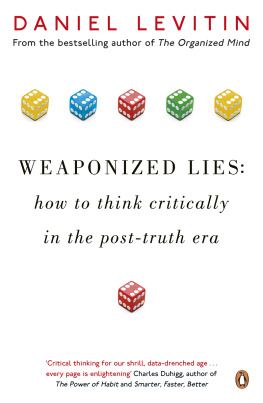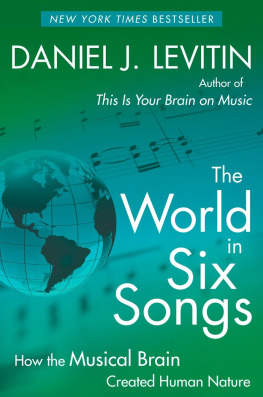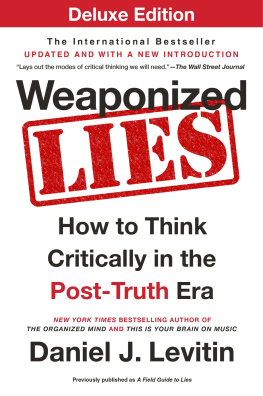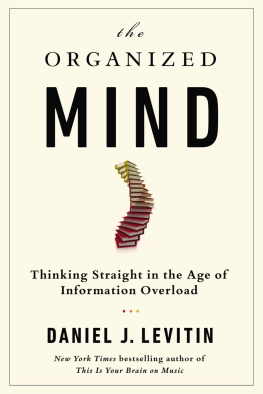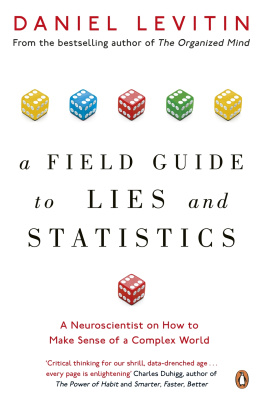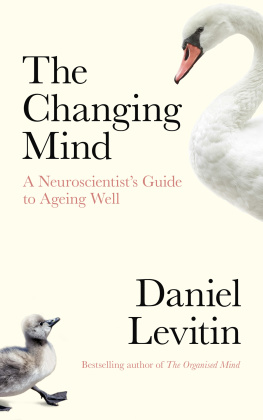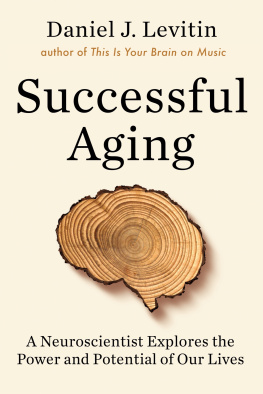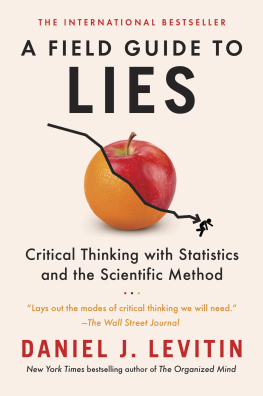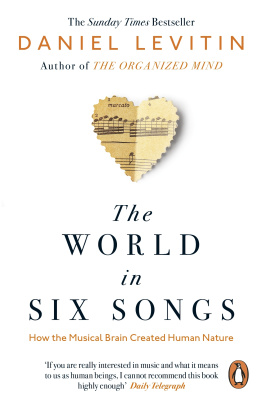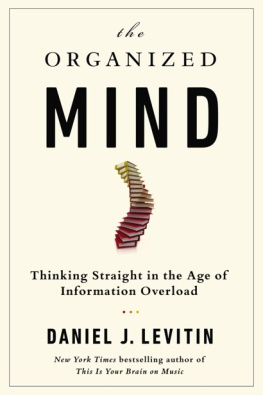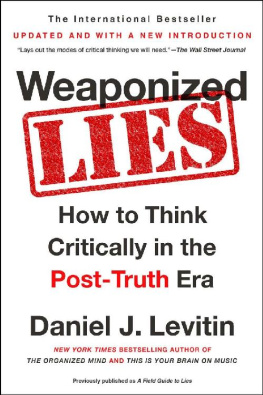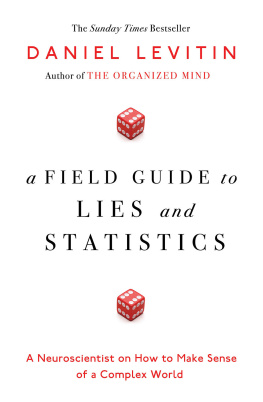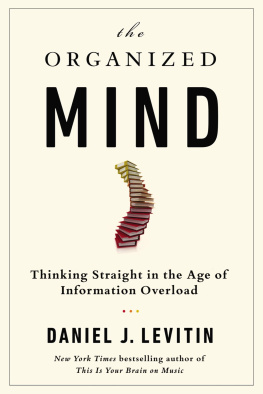ABOUT THE AUTHOR
Dr Daniel J. Levitin has a PhD in Psychology, and trained at Stanford University Medical School and the University of California Berkeley. He is the author of the number-one bestseller This Is Your Brain On Music (Dutton, 2006), published in nineteen languages, and the bestsellers The World in Six Songs (Dutton, 2008) and The Organized Mind (Viking, 2014). Currently he is Dean of Social Sciences at the Minerva Schools at KGI in San Francisco, and a faculty member at the Center for Executive Education in the Haas School of Business at UC Berkeley.
PENGUIN BOOKS
WEAPONIZED LIES
The world is awash with data, but not always with accurate information. [This book] does a terrific job of illustrating the difference between the two with precision and delightful good humour Charles Wheelan, author of Naked Economics
Daniel Levitins field guide is a critical-thinking primer for our shrill, data-drenched age. From the way averages befuddle to the logical fallacies that sneak by us, every page is enlightening Charles Duhigg, author of The Power of Habit and Smarter, Faster, Better
A guide for those who wish to test the authenticity of information that inundates us from every corner, dark and light, of the Web Washington Post
[This book] by the neuroscientist Daniel Levitin lays out the many ways in which each of us can be fooled and misled by numbers and logic, as well as the modes of critical thinking we will need to overcome this Wall Street Journal
Smart, timely and massively useful Globe and Mail, Toronto
Much like Nate Silvers (New York Times bestselling!) The Signal and the Noise, Levitins is that rare book that makes statistics both understandable and at times even intriguing MacLeans
A valuable primer on critical thinking that convincingly illustrates the prevalence of misinformation in everyday life Publishers Weekly
The timing could not be better a survival manual for the post-factual era. Levitin offers a set of intellectual tools to help distinguish the real from the unreal, and often surreal both engaging and rewarding Literary Review of Canada
Valuable tools for anyone willing to evaluate claims and get to the truth of the matter Kirkus Reviews
Misinformation is a curse of the information age, and Levitin offers blow-by-blow demonstrations of how words, numbers and graphics can be manipulated to distort truth Stanford Magazine
Levitin talks about the crucial role of critical thinking and seeking out the truth in todays media landscape Michael Krasny, NPR Forum
Daniel Levitin
WEAPONIZED LIES
How to Think Critically in the Post-Truth Era
(Previously published as A Field Guide to Lies and Statistics)
PENGUIN BOOKS
UK | USA | Canada | Ireland | Australia
India | New Zealand | South Africa
Penguin Books is part of the Penguin Random House group of companies whose addresses can be found at global.penguinrandomhouse.com.
First published as A Field Guide to Lies in the United States of America by Dutton 2016
First published in Great Britain by Viking 2016
First published as Weaponized Lies in the United States of America by Dutton 2017
Published in Penguin Books 2017
Copyright Daniel J. Levitin, 2016, 2017
The moral right of the author has been asserted
Cover design by Mecob
Photograph: Shutterstock.com / Mega Pixel
All art courtesy of the author unless otherwise noted.
Images drawn by Dan Piraro, based on an image by Irving Geis in How to Lie with Statistics, 1954
Image 2016 by Alex Tabarrok, used by permission.
Image ,
Image 2016 by Tyler Vigen, used by permission.
Image .
Image is public domain and provided courtesy of Harrison Prosper.
ISBN: 978-0-241-31357-2
To my sister Shari,
whose inquisitive mind made me a better thinker
Introduction
Thinking, Critically
Im going to start by saying two things that will surely make some people very mad. First, the language we use has begun to obscure the relationship between facts and fantasy. Second, this is a dangerous by-product of a lack of education in our country that has now affected an entire generation of citizens. These two facts have made lies proliferate in our culture to an unprecedented degree. It has made possible the weaponizing of lies so that they can all the more sneakily undermine our ability to make good decisions for ourselves and for our fellow citizens.
What has happened to our language? The Oxford Dictionarys Word of the Year for 2016 was post-truth, which they define as an adjective relating to or denoting circumstances in which objective facts are less influential in shaping public opinion than appeals to emotion and personal belief. It was selected because its usage skyrocketed during that year. I believe we need to get back to using plain old truth againand fast. And we need to reject the idea that truth doesnt exist anymore.
We are all being more than a bit too careful in how we refer to falsehoods. Perhaps in an effort to avoid personal confrontations, an effort to just get along, we have started to use euphemisms to refer to things that are just plain whack-a-do crazy. The lie that the Washington, DC, pizza shop Comet Ping Pong was running a sex-slave operation spearheaded by Hillary Clinton led Edgar M. Welch, twenty-eight, of Salisbury, North Carolina, to drive 350 miles from his home to Washington, DC, and fire his semiautomatic weapon inside the pizzeria on Sunday, December 4, 2016 (just days after post-truth became the word of the year). The New York Daily News called the lie a fringe theory. A theory, by the way, is not just an ideait is an idea based on a careful evaluation of evidence. And not just any evidenceevidence that is relevant to the issue at hand, gathered in an unbiased and rigorous fashion.
Other euphemisms for lies are counterknowledge, half-truths, extreme views, alt truth, conspiracy theories, and, the more recent appellation, fake news.
The phrase fake news sounds too playful, too much like a schoolchild faking illness to get out of a test. These euphemisms obscure the fact that the sex-slave story is an out-and-out lie. The people who wrote it knew that it wasnt true. There are not two sides to a story when one side is a lie. Journalistsand the rest of usmust stop giving equal time to things that dont have a fact-based opposing side. Two sides to a story exist when evidence exists on both sides of a position. Then, reasonable people may disagree about how to weigh that evidence and what conclusion to form from it. Everyone, of course, is entitled to their own opinions. But they are not entitled to their own facts. Lies are an absence of facts and, in many cases, a direct contradiction of them.
Truth matters. A post-truth era is an era of willful irrationality, reversing all the great advances humankind has made. Maybe journalists dont want to call fake news what it is, a lie, because they dont want to offend the liars. But I say offend them! Call them on the carpet.
Perhaps a better formulation is: What has been happening to our educational systems and institutions in the run-up to this post-truth era? The number of books students read on average declines steadily in text or make low-level inferences using printed materials. We have apparently failed to teach our children what constitutes evidence and how to evaluate it. This is worthy of our outrage. Edgar Welch, the Comet Ping Pong shooter, told authorities that he was investigating the conspiracy theory after reading about it online. Our information infrastructure is powerful. It can do good or it can do harm. And each of us needs to know how to separate the two.

